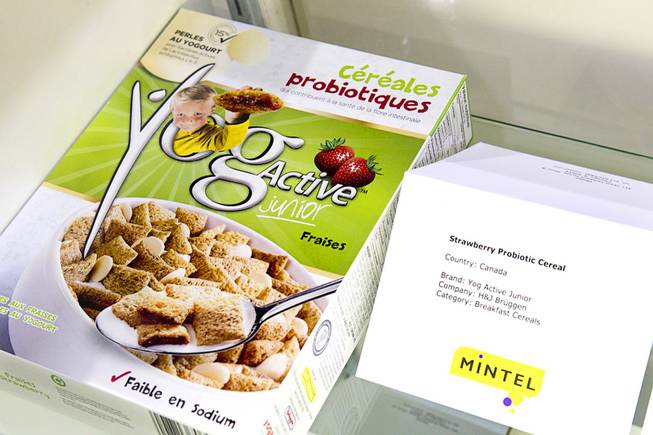
A Canadian breakfast cereal by H&J Bruggen with probiotics is displayed during the IFT Food Expo at the Las Vegas Convention Center, June 25, 2012.
Sunday, March 19, 2017 | 2 a.m.
The microorganisms in our bodies outnumber human cells 10 to 1 and the majority are found in the gut.
Doctors, dietitians, holistic healers, foodies and the generally health-conscious can’t seem to stop talking about probiotics, touted as a miracle cure for everything from digestive diseases to skin problems. But what are these microscopic organisms and how do they work? And do they really live up to the hype?
We explored the claims, the science and the controversy surrounding probiotics. If you’re thinking about introducing them into your health regimen (or if you already have), this is a good place to start in gathering all the facts. Your gut will thank you.
What are probiotics?
Probiotics are microorganisms that live in our digestive tracts. A combination of bacteria and yeast, they occur naturally and help our organs function optimally.
While bacteria tend to get a bad rap for causing disease and infection, there are many “good” bacteria, including those found in probiotics. The National Center for Complementary and Integrative Health (NCCIH) reports that the good bacteria in our intestines “help digest food, destroy disease-causing microorganisms and produce vitamins.”
Several types of live bacteria are under the probiotic umbrella. The two most common are lactobacillus and bifidobacterium. The NCCIH said these two types have been subject to the most research to date. Both are prominent microorganisms that live in everyone’s digestive system and in female genital organs.
Why take probiotics?
Gut feeling
A 2008 study published in Clinical & Experimental Immunology found that the gut is responsible for almost 70 percent of the immune system. When people say that most diseases start in the gut, this is why.
Most people naturally have enough good gut bacteria, but an unhealthy lifestyle, poor diet, certain diseases and antibiotic use can disrupt that balance. This is important because our digestive system is intrinsically linked to our immune system, the mechanism that prevents and fights disease.
The bacteria found in probiotic supplements and certain foods are the same as, or largely similar to, bacteria naturally found in the gut. Because gut bacteria play an integral role in digestive and immune-system health, it’s theorized that taking probiotics can assist and improve these functions as well, bettering your overall health. While the connection between taking probiotics and improving gut health is logical, research is still mixed about whether or not it works.
Beyond digestive issues, taking probiotics might help treat and/or prevent:
• skin conditions (like acne and eczema)
• urinary tract and yeast infections
• allergies
• autoimmune diseases
• liver disease
• colds/flus
While these claims aren’t backed by enough scientific data, many people report successful outcomes after introducing probiotics into their diet. The U.S. Food and Drug Administration has not approved the use of probiotics as a treatment or prevention method for any health problem, but it’s an active field of study.
Are they safe?
The NCCIH reports that probiotics are generally safe for healthy adults to take and do not present serious negative side effects. However, probiotics can be dangerous for people who have underlying medical conditions or compromised immune systems, including elderly people and children. There also is concern about potentially dangerous contaminants lurking in probiotic supplements, which are not evaluated by the FDA. In 2014, contaminants in one such supplement marketed for infants and children caused the death of a baby in Connecticut.
The best sources for probiotics in food
Lactobacillus and bifidobacteria strains often are used to create fermented foods, including wine and cheese. However, while most fermented foods will have some probiotic benefit, some have more live cultures than others and (unfortunately) wine isn’t the best bet when compared with these other probiotic-rich sources:
• Yogurt
• Raw cheese (especially those made from goat's and sheep's milk)
• Kimchi
• Kombucha (fermented tea)
• Sauerkraut
• Miso
• Pickles
• Kefir
• Apple cider vinegar
Supplements
Heed expiration dates and second-guess supplements that don’t have one. Bacteria are living things that die eventually, so they may not be active anymore.
Consult your doctor to be sure probiotic supplements are safe for you. Some doctors may recommend or prescribe a safe and reliable brand, depending on the symptoms you’re trying to treat.
There are hundreds of probiotic supplements available in health food stores, drugstores and online. However, because of the contaminant risk, it’s best to do thorough research before choosing one.
• CFUs: Many supplements advertise the number of “CFUs” or “colony forming units” — basically, the number of single, distinct bacteria. If you’re taking a daily probiotic to improve your general health, keeping the CFU count in a lower range might be best (around 1 billion to 15 or 20 billion). If you’re trying to correct an imbalance in your gut bacteria, higher CFU numbers might be more appropriate.
• Bacteria types: Look at the number of different bacteria in the supplement. Most reputable brands list the specific bacteria as follows: genus/species/strain. For example, you might see “lactobacillus acidophilus PXN 35” or “bifidobacteria bifidum PXN 23.” The general recommendation is to find a supplement that lists multiple bacteria, especially a good mix of lactobacillus and bifidobacteria.
• Best forms: Probiotic supplements come in liquid, powder and pill form, and some require refrigeration. The efficacy of the probiotic depends on the bacteria combination and the product itself, more so than on the dosing technique, so choose whatever form you’re most comfortable with. Be sure to follow the instructions and refrigerate the supplements if necessary.

Join the Discussion:
Check this out for a full explanation of our conversion to the LiveFyre commenting system and instructions on how to sign up for an account.
Full comments policy